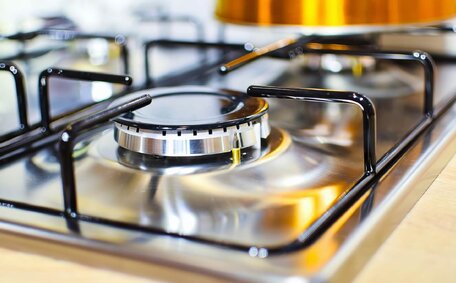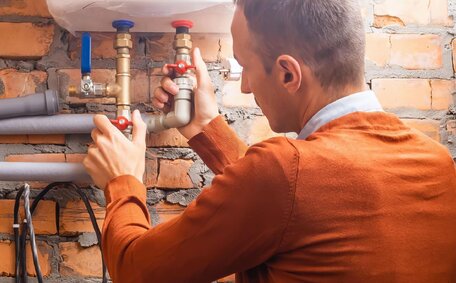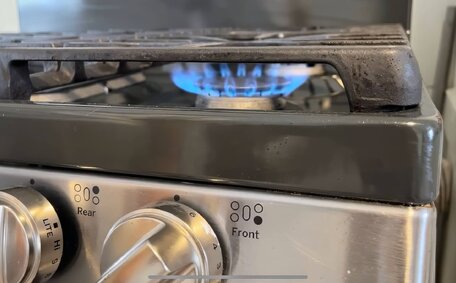Introduction to Hot Water System Efficiency Ratings
For homeowners in Mascot, selecting a highly energy-efficient hot water system is critical. The efficiency rating measures the energy needed to heat water from its source to the storage temperature. Understanding these ratings can help homeowners choose systems that lower energy bills and reduce greenhouse gas emissions.
Water heater efficiency is determined by the energy factor (EF) for storage systems and the uniform energy factor (UEF) for tankless models. A higher rating signifies less energy used by the system, leading to a reduction in overall energy consumption. Highly efficient systems like heat pumps and solar hot water use less energy than traditional systems and can reduce your energy usage and your carbon footprint.
In this article, we’ll explore different types of hot water systems, compare efficiency ratings to help select optimal systems, and provide maintenance tips to keep systems running efficiently over their lifespan. Understanding efficiency metrics is crucial for residents in Mascot to achieve savings on significant household energy expenses like water heating.
Comparing Efficiency of Different Hot Water System Types
Homeowners must compare the energy efficiency of different hot water systems, which vary in efficiency ratings, including:
- Electric storage: Lower efficiency with energy factors (EF) ratings from 0.8 to 0.95.
- Gas storage: Moderately efficient with EF ratings from 0.55 to 0.75.
- Heat pumps: Very high efficiency with uniform energy factors (UEF) from 2.0 to 5.0.
- Solar hot water: Excellent efficiency when sufficient solar radiation, UEF over 2.0.
Solar hot water systems, along with heat pumps, can be the most efficient options as they use renewable energy sources.
Integrated solar heat pump systems can surpass the efficiency of storage gas tanks, outperforming electric models. New water heating systems tend to be more energy-efficient.
When purchasing a new hot water system, look beyond efficiency ratings to also consider upfront costs, operating expenses, hot water delivery, size, and reliability. Our experts can guide you in selecting the most suitable hot water system for your home’s specific needs, ensuring energy bill reductions.
Electric Water Heaters
While gas-electric storage water heaters, with EFs ranging from 0.8 to 0.95, are less efficient than heat pumps or solar options, they have their appropriate applications.
- Electric water heaters often have lower initial equipment costs compared to heat pumps or solar units.
- Simple installation as no gas line or solar panels needed.
- Compact sizes for small spaces.
- They are suitable for households with a moderate demand for hot water.
One major drawback of gas water heaters is their relatively high energy costs. By evaluating both efficiency and your home’s hot water demand, you can determine if a system meets your needs.
Consider the reliance on grid power, as electric tanks are prone to failure during power outages. New split system heat pump electric hybrids enhance efficiency while maintaining an electric backup. Regular maintenance, such as flushing mineral buildup according to tank size, can extend the life and efficiency of the hot water system.
Gas Water Heaters
Gas hot water systems use natural gas or LPG to heat water within an insulated tank. Gas hot water systems tend to have a moderate gas energy rating with typical energy factors (EF) of 0.55 to 0.75.
Benefits of gas pump hot water systems include:
- They consume less energy than electric models.
- Unlimited hot water capacity for high demand households.
- Their energy source isn’t impacted by grid power outages.
- Higher efficiency ratings than electric storage.
Despite a higher initial price, gas hot water heaters can provide long-term savings through lower operating costs. One downside is reliance on fossil fuels and associated greenhouse gas emissions.
Gas tankless units, known for their continuous flow, heat water on demand from cold water so they don’t retain standby losses. But flow rate limits apply. Consider your household’s peak hot water requirements before choosing tankless.
Flushing and anode rod replacements are part of regular maintenance that extends the efficiency and lifespan of your gas storage tank. Upgrading older models to newer high-efficiency units can reduce gas usage and bills.
Heat Pump Water Heaters
Heat pump water heaters stand out as highly efficient systems due to their low energy consumption. They utilise heat pump technology with a tank compressor to "move" heat from the surrounding air, effectively transferring heat into the water tank instead of directly generating it like traditional electric or gas systems.
Key benefits of a pump water heater include:
- Very high energy efficiency with uniform energy factors (UEF) from 2.0 up to 5.0 can help save significantly on operating costs.
- Reduce greenhouse gas emissions by 60-80% compared to electric heat storage tanks.
- They may qualify for government rebates as a renewable energy solution.
- Cooling effect as a byproduct during hot water heating.
Despite their higher initial costs, heat pumps can recoup the difference with substantial energy savings within 5 years. Maintenance requirements are also low compared to gas or solar systems. An integrated solar water heat pump system combines both technologies for optimal efficiency where costs can be offset by energy savings.
Mascot homeowners looking to lower energy bills and environmental impact should strongly consider efficient systems such as heat pumps. Contact our team to assess if a heat pump suits your household’s hot water requirements.
Solar Water Heaters
Solar water heaters rank as some of the most environmentally friendly systems available. They use free heat from the sun to warm water via solar thermal collectors on your roof. Because they rely on solar radiation, they are best suited to Mascot’s sunny climate.
Benefits of solar hot water include:
- Very high efficiency with uniform energy factors (UEF) over 2.0.
- Lower greenhouse gas emissions compared to gas or electric.
- Free renewable energy source once installed.
- Government rebates available to help offset upfront costs.
- Higher initial purchase and installation costs.
- Require adequate solar access on your roof.
- An additional power source such as your electricity grid or gas backup may be necessary during overcast periods.
- Ensure proper size hot water capacity for your household’s peak demand.
An integrated solar heat pump system combines solar gain with heat pump technology for maximum efficiency. Regular maintenance of solar collectors improves performance. Contact Mascot Plumbing to see if solar hot water could be right for your home.
Understanding Energy Star Ratings and Energy Efficiency Labels
Energy efficiency ratings and Energy Star labels provide standard metrics for comparing the energy performance of various hot water system models. The energy star rating indicates the overall heating efficiency on a scale of 1 to 10 stars, with more stars equating to better efficiency and lower energy bills.
For storage tank systems, the key metric is the energy factor (EF), with minimum ratings between 0.80 to 0.95 for electric and 0.55 to 0.75 for gas. The higher the EF, the more efficient the storage tank. Tankless systems use the uniform energy factor (UEF) efficiency gauge instead, typically ranging from 2.0 to 5.0.
These easily comparable ratings let Mascot homeowners quickly assess the running cost and environmental impact of different systems. Heat pumps and solar hot water with UEF ratings over 3.0 help reduce energy usage and are the most efficient.
Units rated at 4 stars or higher are deemed to offer good efficiency. 5-star electric storage or gas tankless models offer better efficiency again.
Reviewing energy rating labels on water heaters helps you understand potential efficiency levels across different brands. The higher the star rating and efficiency factors, the more energy savings during operation. This allows consumers to select optimal systems balancing efficiency, reliability, and water use considerations with their budget.
Selecting the Right Size and Type of Hot Water System
Selecting the proper size and type of storage tank system entails a balance of efficiency, hot water delivery, lifespan, and initial costs. The optimal hot water system can depend on your household’s usage requirements and budget.
When sizing your water heater, a general rule of thumb is 24–32 litres of storage capacity per person for a gas or electric storage tank. For example, the expected amount hot water usage for a family’s heater can involve a capacity of 100–125 litres. Tankless systems are sized by flow rate to meet maximum hot water demand.
Assess which system type best suits your hot water usage. Fuel type, environmental impact, ambient temperature (for heat pumps), and solar insolation levels (for solar) should factor into your evaluation.
While heat pumps and solar electric are the most efficient, they carry higher initial costs.
Weigh long term energy savings against affordability constraints. Gas tankless units provide high flow for larger homes. Simple electric hot water heaters are suitable for small households or apartments with modest demand.
Leverage our expertise to choose an appropriately sized, energy-efficient hot water system that fits your home’s specifications. A right-sized water heater ensures reliable hot water delivery to all taps and fixtures, minimising standby energy losses.
Optimizing Efficiency Through Maintenance and Settings
Proper maintenance and settings adjustments can optimise the efficiency of the hot water system your Mascot home uses. Here are some tips:
- Set the thermostat to 60°C. Any higher causes excessive standby losses.
- Insulate hot water pipes to minimise heat loss.
- Drain 1-2 litres from the relief valve yearly to flush sediment.
- Replace anode rods every 5 years in electric/gas storage tanks.
- Clear debris from solar collectors and maximise roof exposure.
- Bleed radiators and check antifreeze levels in hydronic heaters.
- Consider a timer or smart controls to limit heating during low-use periods.
Mascot Plumbing technicians perform annual services to inspect systems for leaks, corrosion, and scale buildup to maintain efficiency. Replacing old, inefficient models with the latest energy-saving systems can also optimise hot water costs and sustainability.
Staying on top of maintenance lets you maximise efficiency ratings and savings from your hot water system investment over its lifespan.
Leveraging Rebates and Incentives for Efficient Systems
When selecting a new water system, your Mascot residence might be eligible for rebates and incentives for installing energy-efficient models. This can help offset higher upfront costs of heat pumps or solar systems to make them more affordable.
The NSW government offers generous rebates for the best hot water systems like heat pumps and solar hot water under the Empowering Homes programme. Rebates up to $1000 are available for heat pump systems based on efficiency ratings. The solar hot water system is eligible for rebates between $500 to $3600 depending on climate zone and electric boosting.
Federal government rebates may also be available for solar hot water installations. Contact our Mascot Plumbing team to check eligibility criteria for current rebates and ensure selected systems qualify before purchasing and installation.
Using solar or heat pump rebates to upgrade from gas or electric storage tanks can make the switch more economical. The long term savings on energy bills continue well after the rebates and incentives bring down initial purchase costs.
Mascot households should consider heat pump and solar electric systems for the most efficient hot water heating with minimal greenhouse emissions, especially when supported by robust rebate programs.
Reducing Environmental Impact With Efficient Hot Water
Selecting an energy-efficient hot water system is one of the best ways Mascot households can reduce their environmental impact. High efficiency systems like heat pumps and solar hot water lower greenhouse gas emissions associated with water heating - estimated to produce over 20% of an average home’s emissions.
Heat pump water heaters can decrease emissions by 60-80% compared to conventional electric storage tanks, using less energy than conventional systems, enhancing water heater efficiency. Solar systems with properly sized panels and storage offer efficient water heating, eliminating gas or grid power usage completely when sufficient sunlight is available.
As rebates and incentives make solar and heat pump hot water installations more affordable, Mascot residents have compelling environmental and economic reasons to upgrade older systems. The long term savings and smaller carbon footprint keep making a difference year after year.
Our team is ready to evaluate your home’s requirements and offer guidance on choosing an efficient, correctly sized hot water system. We can assist in navigating available rebates and selecting the best system to minimise your energy bills and the environmental impact of water heating.






